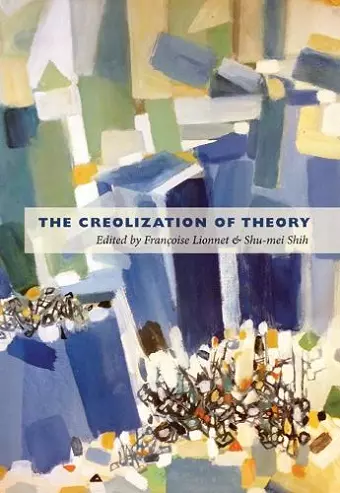The Creolization of Theory
Shu-mei Shih editor Françoise Lionnet editor
Format:Hardback
Publisher:Duke University Press
Published:19th May '11
Currently unavailable, and unfortunately no date known when it will be back

This bold intervention in debates about the role of theory in the humanities advocates the development of a reciprocal, relational, and intersectional critical methodology attentive to the legacies of colonialism.Introducing this collection of essays, FranÇoise Lionnet and Shu-mei Shih argue that looking back-investigating the historical, intellectual, and political entanglements of contemporary academic disciplines-offers a way for scholars in the humanities to move critical debates forward. They describe how disciplines or methodologies that seem distinct today emerged from overlapping intellectual and political currents in the 1960s and early 1970s, in the era of decolonization, the U.S. civil rights movement, and antiwar activism. While both American ethnic studies programs and “French theory” originated in decolonial impulses, over time, French theory became depoliticized in the American academy. Meanwhile, ethnic studies, and later also postcolonial studies, developed politically and historically grounded critiques of inequality. Suggesting that the abstract universalisms of Euro-American theory may ultimately be the source of its demise, Lionnet and Shih advocate the creolization of theory: the development of a reciprocal, relational, and intersectional critical approach attentive to the legacies of colonialism. This use of creolization as a theoretical and analytical rubric is placed in critical context by Dominique ChancÉ, who provides a genealogy of the concept of creolization. In their essays, leading figures in their fields explore the intellectual, disciplinary, and ethical implications of the creolized theory elaborated by Lionnet and Shih. Édouard Glisssant links the extremes of globalization to those of colonialism and imperialism in an interview appearing for the first time in English in this volume. The Creolization of Theory is a bold intervention in debates about the role of theory in the humanities.
Contributors. Étienne Balibar, Dominique ChancÉ, Pheng Cheah, Leo Ching, Liz Constable, Anne Donadey, Fatima El-Tayeb, Julin Everett, Édouard Glissant, Barnor Hesse, Ping-hui Liao, FranÇoise Lionnet, Walter Mignolo, Andrea Schwieger Hiepko, Shu-mei Shih
“The Creolization of Theory is a highly significant, originally and thoughtfully conceived volume. It advances contemporary debates about the place of theory in cultural criticism in the aftermath of postmodernism, decolonization, and globalization. One of its greatest contributions is to critically decenter European theory in order to highlight the plurality of theories that emerges out of the material processes of decolonization.”-Lisa Lowe, University of California, San Diego “Showcasing considerable critical vision and rigorous inquiry, The Creolization of Theory is an ambitious collective endeavor to rethink the notion of theory, which has been instrumental in reshaping humanistic studies in North America in the past few decades. The contributors help to develop an understanding of theory as an evolving, rather than completed, phenomenon, one that must continue to be subject to new historical and cross-cultural challenges.”-Rey Chow, author of The Age of the World Target: Self-Referentiality in War, Theory, and Comparative Work “The essays in The Creolization of Theory present us with an excess of lucidity on the complex issues that grow out of the mixings, interrelations, and multidirectionalities of theory in today’s world. Their implications range far beyond the academy. Several of the essays here are destined to be returned to again and again. A volume to be celebrated.”-Ato Quayson, author of Aesthetic Nervousness: Disability and the Crisis of Representation “[T]he essays investigate entanglements in knowledge systems, offering productive approaches rather than misleading dichotomies. Summing Up: Recommended. Graduate students, researchers, faculty.” - R. D. Newman (Choice) “This rich and impressively broad-ranging book lives up to its interdisciplinary billing, embodying, often within the same essay, a multiplicity of approaches and methods. It is testament to the fact that reports of theory’s death have not only been exaggerated, but indeed positively misplaced.” - Maeve McCusker (Modern Language Review) “As a whole, The Creolization of Theory is extremely well-written. While the contributors specialize in fields as diverse as political philosophy, comparative literature, gender studies, and Area Studies, they successfully present their ideas using terminology comprehensible for general scholars. Moreover, the book is more than the sum of its parts: the deliberate cross-dialogue between the essays will forward future thought.” - Jonathan Fleck (E3W Review of Books) "The essays of this volume, which constantly reflect upon the place of theory in the academy, as well as the origins and future of postcolonial, ethnic and Francophone studies, constitute a landmark of postcolonial studies that will no doubt be of great interest to students and scholars alike." - Roxanna Curto (SubStance)
ISBN: 9780822348320
Dimensions: unknown
Weight: 585g
320 pages